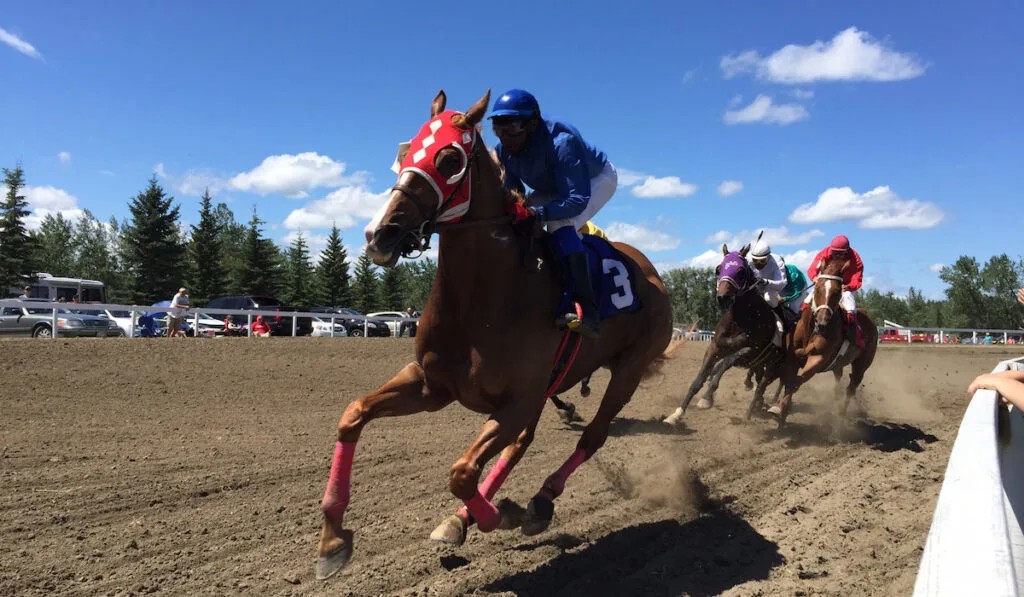
Horse racing is one of the most thrilling and time-honoured sports globally, attracting bettors from all walks of life. Whether you’re captivated by the excitement of the races or enticed by the potential for substantial payouts, understanding horse racing betting & odds is essential for beginners. This guide will walk you through the basics, helping you get started on the right foot and fully enjoy the betting experience.
The Basics of Horse Racing Betting
Before placing your first bet, it’s crucial to understand the types of bets available in horse racing. Here are the most common ones:
- Win Bet:The most straightforward bet where you pick a horse to finish first. If your horse wins, so do you.
- Place Bet:A place bet allows you to win if your horse finishes in one of the top positions—usually first or second. This bet offers lower risk compared to a win bet, but the payout is also smaller.
- Each-Way Bet:An each-way bet is essentially two bets in one—one on the horse to win and one on the horse to place. If your horse wins, you collect on both the win and place bets. If it places, you still win the place portion of the bet.
- Exacta/Forecast:This bet involves picking the first two horses to finish in the correct order. It’s more challenging than a win bet but offers higher payouts.
- Trifecta/Tricast:Similar to the Exacta, but you must predict the first three horses to finish in the correct order. This bet is difficult to win but can be highly rewarding.
- Superfecta:The Superfecta requires you to pick the first four horses to finish in the exact order. While this is a tough bet to win, the potential payouts are substantial.
- Accumulator:An accumulator combines multiple bets across different races into one. All selections must win for the bet to payout, but the returns can be significant due to the increased risk.
How Horse Racing Odds Work
Odds are a fundamental part of horse racing betting, representing the potential payout for a winning bet and the implied probability of an outcome. Understanding how odds work will help you make informed betting decisions:
- Fractional Odds:Commonly used in the UK, fractional odds show the ratio of the profit to the stake. For example, if the odds are 5/1, you’ll win £5 for every £1 bet, plus your original stake. If the odds are 2/1, you’ll win £2 for every £1 bet.
- Decimal Odds:Popular in Europe and Australia, decimal odds represent the total payout (including your stake) per unit bet. For instance, if the odds are 6.00, you’ll receive £6 for every £1 bet, including your stake.
- Moneyline Odds:Mostly used in the US, moneyline odds can be positive or negative. Positive odds show how much you’d win on a £100 bet, while negative odds show how much you need to bet to win £100.
Reading the Odds
Understanding how to read odds is crucial for determining value and making smart bets:
- Short Odds:Horses with short odds, such as 2/1, are considered favorites. They have a higher probability of winning but offer lower payouts.
- Long Odds:Horses with long odds, such as 50/1, are considered underdogs. They have a lower probability of winning but offer much higher payouts.
- Even Money:Odds of 1/1 or 2.00 in decimal form mean that your potential profit is equal to your stake. Even money bets are considered 50/50 propositions.
Factors Influencing Odds
Several factors influence the odds in horse racing, and understanding them can give you an edge:
- Form:The horse’s recent performances are often the most significant factor. A horse in good form is likely to have shorter odds.
- Class:The level of competition the horse is running against can affect its odds. A horse stepping up in class might have longer odds due to tougher competition, while a horse dropping in class might have shorter odds.
- Jockey and Trainer:The reputation and success rate of the jockey and trainer can influence a horse’s odds. Successful combinations often lead to shorter odds.
- Track Conditions (Going):The condition of the racetrack, such as firm, good, soft, or heavy, can significantly impact a horse’s performance. Horses that perform well in certain conditions may have shorter odds when those conditions are present.
- Betting Market:As more bets are placed on a horse, the odds may shorten due to increased demand. Conversely, odds may lengthen if a horse receives fewer bets.
Tips for Beginners
Getting started with horse racing betting can be exciting, but it’s essential to approach it with a strategy:
- Start Small:Begin with small bets to get a feel for how the odds work and how races unfold. As you gain experience, you can gradually increase your stakes.
- Do Your Research:Analyze the form, class, jockey, trainer, and track conditions before placing a bet. The more information you have, the better your chances of making an informed decision.
- Set a Budget:Decide how much you’re willing to spend on betting and stick to it. Never bet more than you can afford to lose, and avoid chasing losses.
- Diversify Your Bets:Instead of putting all your money on a single horse, consider spreading your bets across different horses or races. This approach reduces risk and increases your chances of winning.
- Use Promotions:Many betting sites offer promotions such as free bets or enhanced odds, which can add value to your betting experience. Take advantage of these offers, but be sure to read the terms and conditions.
- Stay Disciplined:Betting on horse racing should be fun and not a way to make quick money. Stay disciplined, follow your strategy, and avoid emotional betting.
Conclusion
Horse racing betting is an exciting and potentially rewarding way to engage with the sport. By understanding the different types of bets, how odds work, and the factors that influence them, you can make more informed decisions and improve your chances of success. Remember, the key to successful betting is research, discipline, and a clear strategy. Whether you’re at the track or betting online, these tips will help you enjoy the experience while maximizing your potential winnings. Good luck, and may the best horse win!



